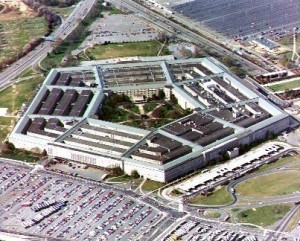So the planned furloughs for some 650,000 civilian workers at the Department of Defense have begun. Roughly speaking, this will mean about a 20 percent cut in each paycheck until September. This is supposed to save the Pentagon $1.8 billion, which is a drop in the bucket in the savings they are supposed to be making elsewhere (and could be — like in runaway health care and retirement costs, over-extended and unnecessary weapons programs, rampant redundancies and war waste) in the budget. But putting workers on the chopping block appears to be the politically expedient way for the Pentagon to get headlines in protest of sequester, and really, who cares about civilian pay anyway? They’re just federal drones who probably make more money than they deserve, right? 
Well, truth is, while Planet DoD may have created too many jobs sucking up our dwindling taxpayer resources, the civilian jobs range from the executive all the way down to the secretary, with every pay scale in between. They also include, as we’re reading today, mental health care providers for servicemembers suffering from traumatic brain injury (TBI) and post-traumatic stress disorder (PTSD). From Stars and Stripes today:
Due to sequestration, furloughs that affected a variety of civil service employees including behavioral and mental health providers began last week. The mental health directorate of Naval Hospital Camp Lejeune sees more than 1,500 patients between civil service employees, active duty service members and contract employees. Prior to the furloughs civil service employees accounted for 425 of those appointments. Now they will only be able to render 365.
“My provider is a civilian facing furlough,” (Cpl. Eric )Smith said. “Before the furloughs she wanted to see me once every 10 days, but that couldn’t happen because of her patient load. Now the furlough is just going to push my treatment days even further apart.”
Smith, who suffered a Traumatic Brain Injury during one of his two deployments to Afghanistan, was diagnosed with post traumatic stress disorder and major depressive disorder in 2010.
Smith compared a cognitive therapy group he attends to Alcoholics Anonymous but for service members suffering from PTSD — and says it has been the most therapeutic treatment he has been afforded.
“I’m not nervous about what will happen to me with these furloughs — I’m over the hump in treatment,” Smith said. “I’m worried about the one’s just starting out. They’re the one’s we need to watch out for.”
As this one writer points out, the size of the civilian workforce has gotten out of control. We know that, and something needs to be done about it before we can bring the defense budget back into balance with reality. But it would seem there is no serious plan for reducing it in any practical way that tackles real waste and redundancy first, while protecting individuals from abrupt financial strain and from losing necessary services to boot. As this story today about one of the latest soldier-suicides suggests, politically expedient Band Aids may not have quite the effect the spinmeisters in the E-Ring were looking for. In fact, in some quarters, it may make things a whole lot worse.




??? ?????
??? ?????
??? ???????
??? ??
???? ?? ????
??? ?? ????
??? ???
??? ????
???? ???
??? ????? ?????
??? ???? ?????
??? ???? ?????
??? ?????
??? ???
Your website is really cool and this is a great inspiring article. Thank you so much. link Building
I admire this article for the well-researched content and excellent wording. I got so involved in this material that I couldn’t stop reading. I am impressed with your work and skill. Thank you so much.http://mobilehacks4u.com/clash-of-clans-hack-add-…
what the government wants, and then discards them like used crash test dummies… cab service jaipur to delhi
You have done a great job on this article. It’s very readable and highly intelligent. You have even managed to make it understandable and easy to read.
http://www.amazon.com/Ejaculation-Guru-Review-EBo…
As i experience such a web site sincerely perfect for of which uni organization. Were simply just hoping to identified extra highly effective details at a later date….buy real instagram followers that like
I really appreciate the kind of topics you post here. Thanks for sharing us a great information that is actually helpful. Good day! manual blog commenting
I have been doing this for many years and joined here to expand my reach and further develop my career. Feel free to ask me any questions about my service. Buy backlinks
Thanks for sharing this interesting blog with us.My pleasure to being here on your blog. buy real likes
Word of love and appreciation and greeting fulfillment and private
Greeting fill all the meanings of brotherhood and friendship
Greetings from the Heart to Heart
Thank you with all my heart
GREAT ARTICLE TNX FOR WORK I LOVE THIS
????? ???
and welcom to d great blog for cooking games
Your post was very nicely written. I’ll be back in the future for sure!
facebook